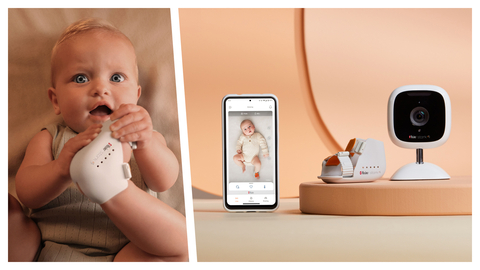IRVINE, Calif.– Masimo (NASDAQ: MASI), a global leader in innovative monitoring technologies used in top hospitals, announced today FDA clearance of Stork™, a revolutionary baby monitoring system, for prescription use with healthy and sick babies 0-18 months of age. Leveraging the same Masimo sensor technology that monitors more than 10 million babies in hospitals every year, Stork provides continuous, accurate monitoring of a baby’s health. Stork is available at retailers nationwide as a non-medical device for general health and wellness purposes. With this clearance, Stork is now available for prescription use to continuously monitor babies at home as a medical device for healthy or sick babies.
“When my son was born, we were concerned about his breathing. Our doctor prescribed pulse oximetry monitoring for a week for him. A therapist arrived at our home with a large standalone pulse oximeter made for hospitals, with cables and wires everywhere and tethered to our son, and charged us $5,000 for a week of monitoring,” said Joe Kiani, Founder and CEO of Masimo. “I know how important it is for parents to better understand their baby’s physiological well-being, especially when they are sick, and it’s our privilege to provide them with an easy-to-use, accurate product that allows them to continuously monitor key vital signs for less than one tenth of the cost I paid, and also includes video surveillance.”
When prescribed, parents and family members will now be able to receive alarms regarding their baby’s oxygen saturation (SpO2), pulse rate (PR), and skin temperature. They will be able to share these vital signs data remotely with clinicians. In addition, Stork alerts parents if their baby turns over and is sleeping face down, which can be dangerous for babies.
Stork leverages the same technology that has been used on babies in the neonatal intensive care unit (NICU) for years, helping to improve health outcomes for the youngest and most vulnerable patients. Known as Signal Extraction Technology®, or SET®, this technology has helped clinicians reduce the incidence of neonatal blindness from retinopathy of prematurity1 and has led to significant improvements in screening newborns for critical congenital heart disease.2 Stork’s SpO2 performance specification is industry-leading, at 1.5% ARMS* at one standard deviation, even during motion.
This patented sensor technology nests within the Stork boot, which is made from an ultra-soft, medical-grade silicone that conforms gently to the baby’s skin and is available in three sizes to ensure a perfect fit as the child grows. The sensor embedded in the boot is the product of meticulous engineering that harnesses decades of expertise in non-invasive monitoring to detect babies’ SpO2, PR, and skin temperature continuously with unprecedented accuracy and dependability.
With a sleek, minimalistic design ideal for any nursery aesthetic, the Stork Vitals+ bundle includes the boot with sensor that monitors baby’s skin temperature, pulse rate, and oxygen saturation, and a 2K Quad High-Definition (QHD) capable camera with technology supported by the TODA platform from Like Minded Labs. The camera hardware and software architecture are designed to leverage and be compatible with future edge AI-based features, in development. For those who do not require streaming video, the Stork Vitals bundle replaces the camera with a health hub, which connects the Stork vital signs sensor/boot to the Stork app, while still allowing parents to hear and speak to their baby. Stork also monitors the temperature of the baby’s room.
Dr. Ryan S. Bode, a national leader in pediatric hospital medicine and pediatric quality and safety, commented, “I have cared for hospitalized children for over 20 years. In addition, my passion and research interests have focused on quality improvement and patient safety in delivering high value pediatric care and ensuring optimal patient outcomes. Masimo SET® pulse oximetry technology is unmatched in its ability to measure accurately even when children move or have low perfusion. Any caregiver, parent, or clinician looking to monitor key vitals in young babies should ensure they have accurate, reliable technology, like SET® pulse oximetry.”
Dr. Mitchell R. Goldstein, Professor of Pediatrics at Loma Linda University, said, “I had the privilege of having access to one of the earliest Masimo SET® pulse oximeters. A young baby, Joshua, came to our unit at extremis, and we attempted all life-saving measures to get his pulse on a non-Masimo device. With no success, we then tried the Masimo monitor and were able to get readings of his vitals, a signal that we should continue to provide care. Joshua survived and was eventually sent home with his parents, and our unit has relied on Masimo SET® ever since. It is the only pulse oximeter I’m aware of that has provided the ability from the beginning to measure through challenging conditions and with darker skin colors, as was the case with Joshua. I am glad to see this life-saving technology being expanded to the home.”


